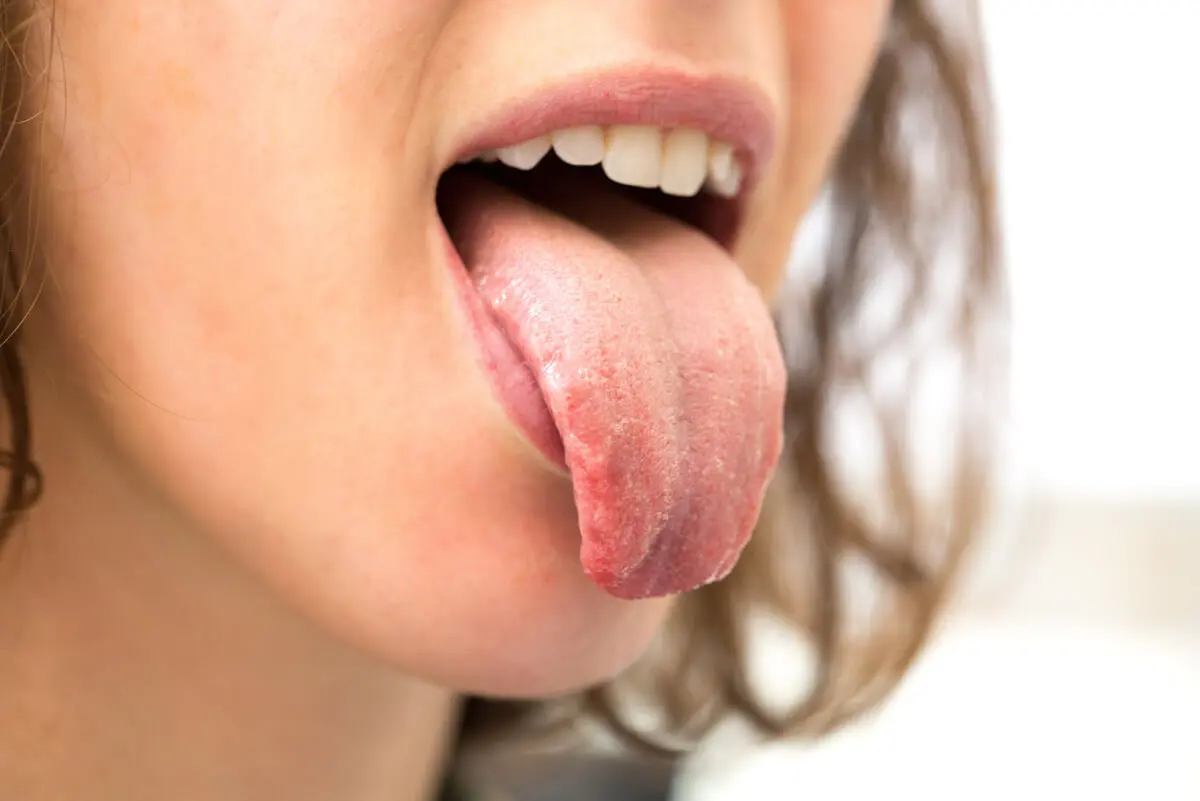Dry Mouth During Pregnancy: Causes and Treatments


Written and verified by the dentist Vanesa Evangelina Buffa
Pregnancy brings about many changes in a woman’s body. Dry mouth during pregnancy is a fairly common manifestation that isn’t often mentioned. It’s often the consequence of hormonal changes and increased water requirements for the proper development of the baby.
However, there are other factors that predispose us to have less saliva in the mouth. Whatever the situation, it’s good to be aware of this symptom. First of all, because it may be a sign of a health problem; on the other hand, because the lack of saliva favors the appearance of oral pathologies.
However, some home remedies can help to alleviate this problem. Of course, there are also medical treatments that are used whenever necessary. Here’s everything you need to know about it.
Pregnancy and dry mouth
Saliva is an oral fluid that has important lubricating, antibacterial, and antifungal functions. In addition, it favors the healing of oral tissues, participates in the process of food digestion, and influences the ability to speak.
Its production and excretion inside the mouth is controlled by the salivary glands. When these structures suffer a problem that alters their normal functioning, the person suffers from what is known as “xerostomia” or “dry mouth syndrome”.
Saliva keeps the mouth moist. When its production is insufficient or its quality changes, the mouth feels dry and uncomfortable.
Dry mouth is one of the most common oral conditions in pregnancy. It usually begins in the first trimester and usually manifests itself upon awakening, as saliva production decreases during the night.
Hormonal changes are usually the main trigger. Even so, we shouldn’t ignore the fact that it’s also associated with other factors or may indicate the presence of some illness.

Symptoms of dry mouth during pregnancy
The scarcity of saliva and the uncomfortable sensation of dry oral mucosa is the main symptom of dry mouth during pregnancy. In addition to this, there are other symptoms that often accompany this disorder:
- Changes in the sense of taste or a metallic taste in the mouth
- Chapped lips
- Whitish tongue upon awakening
- Bad breath
- Burning in the mouth or throat
- Difficulty swallowing
- Stuffy nose or dryness inside the nose
- Headaches
- Problems speaking well
- Indigestion
- Hoarseness
- Hot flushes
- The appearance of cavities or gum inflammation
Find out more here: Why Do People with Diabetes Experience Dry Mouth?
Causes of dry mouth during pregnancy
Hormonal changes and the increased need for water during pregnancy are usually the main triggers for dry mouth. These changes during pregnancy predispose a woman to some situations that favor xerostomia. Here are the most frequent causes.
Dehydration
When the body loses water faster than it takes in, dehydration occurs. In pregnancy, fluid needs are greater, as water helps the baby to develop.
Not having adequate hydration to replace water loss can cause serious problems. In severe cases, it can lead to birth defects or premature delivery.
Of course, this condition causes other symptoms beyond dry mouth. The most common are the following:
- A feeling of suffocation or overheating
- Dark yellow urine
- Extreme thirst
- Fatigue
- Dizziness
- Headaches
Drinking plenty of water during pregnancy helps prevent dehydration. It’s important to replace fluid loss, especially in the first trimester when nausea and vomiting are common.
Candidiasis
Candidiasis is an infection caused by the overgrowth of a fungus called Candida albicans. We all have this microorganism in our mouth in small amounts, but when this germ grows more than normal, this pathology can develop.
During pregnancy, the immune system can be affected. With this, the balance of the normal flora of the mouth is lost and the fungus proliferates in an exaggerated manner. Other symptoms are white lesions on the tongue and cheeks, resembling cottage cheese.
If these spots are scratched, they bleed. In addition, the mouth will be red and sore, and there are often problems with taste.
Sleep problems
Pregnancy can cause sleep problems, ranging from not being able to fall asleep to waking up several times during the night. Breathing problems, such as snoring and sleep apnea, are also common.
Hormonal changes can cause the throat and nasal passages to narrow, leading to problems breathing through the nose. During the second and third trimester of pregnancy, snoring is quite common. This is more common in women who are overweight, smoke, or have enlarged tonsils.
Snoring and sleep apnea lead to the pregnant woman breathing through her mouth while sleeping. Because of this, salivary production decreases, and dry mouth appears.
Gestational diabetes
Gestational diabetes is when blood sugar levels are very high. In general, it usually disappears after giving birth. During pregnancy, a woman needs more insulin than usual, and, when her body isn’t able to produce that extra amount, this condition occurs.
As expected, suffering from this condition carries risks for both mother and baby. For this reason, it’s important to monitor the situation carefully and improve your lifestyle. A healthy diet, exercise and, in some cases, medication or insulin help to control the problem.
If symptoms occur, dry mouth during pregnancy is one of them. In addition, women may experience excessive thirst, fatigue, tiredness, and the need to urinate more frequently than usual.
Discover more here: Nutritional Treatment for Type 2 Diabetes
Consequences of having a dry mouth during pregnancy
Having a dry mouth during pregnancy causes discomfort for women and can lead to some complications. Saliva has the function of self-cleaning and germ control in the mouth area.
Therefore, when saliva is scarce or very viscous, this natural protection decreases. Microorganisms then find an ideal habitat to proliferate and generate problems, such as the accumulation of bacterial plaque and tartar, caries, gingivitis, and periodontal disease.
These disorders shouldn’t be taken lightly. Suffering from any of these oral pathologies during pregnancy can affect the development of the fetus, among other complications.
Also, the dryness of the mouth at this stage may be a warning sign of a more serious condition. The most common are the following:
- Gestational diabetes: This pathology affects the structure of the salivary glands and increases daily urination, which reduces the amount of water available to produce saliva.
- Anemia: Dry mouth, accompanied by other symptoms such as dry throat, cuts in the corners of the mouth, and a burning tongue, is sometimes a sign of anemia.
- High blood pressure: Experiencing sudden dry mouth accompanied by a throbbing headache may be caused by an unexpected rise in blood pressure. Hypertension affects the health of mother and baby and should be treated urgently.
Treatment of dry mouth in pregnancy
Since dry mouth in pregnancy alerts us to other health problems, it’s necessary to find the trigger to resolve the situation properly. In this regard, it’s advisable to discuss the problem with the gynecologist so that they can access the relevant tests.
Whatever the situation, some home tips can be applied to mitigate the discomfort derived from this symptom. The most relevant are the following:
- Drink at least two to three liters of water a day. Keeping a bottle handy to drink at regular intervals or sucking on small pieces of ice helps keep the mouth moist.
- Breathing through the nose at all times, even when sleeping, prevents saliva from evaporating. If nasal breathing is made difficult by respiratory problems, doing steam treatments several times a day helps to clear the airways and reduce internal dryness.
- Avoid consuming alcohol, tobacco, and coffee during pregnancy. These products are very dangerous for the baby and the mother, and can also cause dehydration.
- Use a humidifier in the bedroom, especially when living in dry areas.
- Chew sugarless gum or candy, as this action stimulates salivary production.
- Practice good oral hygiene. Brushing, flossing, and using fluoride toothpaste after every meal reduces the discomfort and complications of dry mouth.
- Follow a healthy and balanced diet containing fruits, vegetables, whole grains, nuts and lean meats. It’s important to avoid ultra-processed foods and foods with a high sodium content, as they can accelerate the loss of water from the body.

When to see a doctor?
If home remedies aren’t enough to control dry mouth during pregnancy, it’ll be necessary to consult a doctor. As mentioned, finding the cause of the problem and treating it helps prevent complications. Treatment may include some of the following actions:
- Changing the usual medications that may be causing dry mouth.
- Using fluoride trays (carriers), artificial saliva, or special mouthwashes.
- Treating sleep apnea or snoring, if these are causing xerostomia.
- Treating candidiasis with antifungals if that’s the cause of dry mouth.
- Establishing a management plan for gestational diabetes. Certain dietary guidelines, exercise and, in some cases, oral medications or insulin will be necessary.
It’s also a good idea to consult a physician if any of the following symptoms appear:
- Whitish or red lesions in the mouth
- Mouth pain or burning
- Excessive thirst
- Fatigue, snoring, and frequent awakenings during the night
- The need to urinate more frequently
- Toothache that doesn’t go away, tooth sensitivity, or brown or black spots on the teeth
- Disorientation
- Black or bloody stools
- Headaches
These manifestations are associated with other disorders that should be diagnosed and treated as soon as possible.
Controlling dry mouth in pregnancy
Hormonal changes and increased water needs are associated with dry mouth during pregnancy. Fortunately, with simple measures that can be applied at home, this symptom can be alleviated.
However, it’s always a good idea to discuss this discomfort with the doctor monitoring the pregnancy. In some cases, xerostomia is a manifestation of a more complex disorder that requires timely diagnosis and treatment.
Of course, it shouldn’t be overlooked that this symptom increases the risk of oral problems such as cavities, gingivitis, and infections. Because of this, it doesn’t hurt to consult a dentist.
Hydration, oral hygiene, a healthy diet, and regular medical and dental check-ups will be vital to control this problem.
All cited sources were thoroughly reviewed by our team to ensure their quality, reliability, currency, and validity. The bibliography of this article was considered reliable and of academic or scientific accuracy.
- Mancheno Valenzuela, C. L. (2021). Odontología preventiva durante el embarazo (Bachelor’s thesis, Universidad de Guayaquil. Facultad Piloto de Odontología).
- de la Paz Suárez, T., Alguacil, C. D. L. M. G., & Rodríguez, L. N. (2014). Boca seca: causas, diagnóstico y tratamiento. Revista Electrónica Dr. Zoilo E. Marinello Vidaurreta, 39(10).
- Quirce Galindo, L. (2020). El papel de la enfermería en el estilo de vida del embarazo.
- Salvatierra Ratti, E. J. (2020). Salud oral y diabetes gestacional (Bachelor’s thesis, Universidad de Guayaquil. Facultad Piloto de Odontología).
- PONCE PÁRRAGA, M. M. (2017). PREVALENCIA DE MANIFESTACIONES ORALES ASOCIADAS A DIABETES GESTACIONAL. CENTRO DE SALUD RESBALÓN, ÁREA DE ODONTOLOGÍA (Doctoral dissertation).
- Curiel Álvarez, A., & Dorta, D. (2019). Abordaje clínico odontológico de la mujer embarazada. Revisión de la literatura.
- Fernández, Y. G. (2020). Impacto de la diabetes gestacional en la morbimortalidad neonatal. NPunto, 3(28), 25-42.
- Rambay Holguín, G. A. (2022). Enfermedades periodontales y sus riesgos en la mujer gestante (Bachelor’s thesis, Universidad de Guayaquil. Facultad Piloto de Odontología).
- Alfaro Alfaro, A., Castejón Navas, I., Magán Sánchez, R., & Alfaro Alfaro, M. J. (2018). Embarazo y salud oral. Revista Clínica de Medicina de Familia, 11(3), 144-153.
- Praharaj, N., & Naik, D. (2020). Management of Oral Health During Pregnancy. Indian Journal of Forensic Medicine & Toxicology, 14(4).
This text is provided for informational purposes only and does not replace consultation with a professional. If in doubt, consult your specialist.








